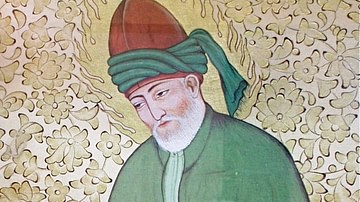Search
Search Results

Definition
Chretien de Troyes
Chretien de Troyes (l. c. 1130-1190 CE) was the greatest romantic poet of his era, regarded today as the Father of Arthurian Romance (along with Geoffrey of Monmouth) and also Father of the Novel owing to his narrative form. He was most likely...

Article
Daily Life in Medieval Japan
Daily life in medieval Japan (1185-1606 CE) was, for most people, the age-old struggle to put food on the table, build a family, stay healthy, and try to enjoy the finer things in life whenever possible. The upper classes had better and more...

Definition
Petrarch
Petrarch (1304-1374 CE), full name Francesco Petrarca, was an Italian scholar and poet who is credited as one of the founders of the Renaissance movement in art, thought, and literature. Petrarch actively searched for 'lost' ancient manuscripts...

Definition
Geoffrey Chaucer
Geoffrey Chaucer (l. c. 1343-1400 CE) was a medieval English poet, writer, and philosopher best known for his work The Canterbury Tales, a masterpiece of world literature. The Canterbury Tales is a work of poetry featuring a group of pilgrims...

Definition
Rumi
Jalal ad-Din Muhammad Rumi (also given as Jalal ad-did Muhammad Balkhi, best known as Rumi, l. 1207-1273 CE) was a Persian Islamic theologian and scholar but became famous as a mystical poet whose work focuses on the opportunity for a meaningful...

Definition
Merlin
Merlin (also known as Myrddin, Merlinus) is the great wizard of the Arthurian Legends best known from Sir Thomas Malory's Le Morte D'Arthur (1469 CE). The character was created by Geoffrey of Monmouth in his History of the Kings of Britain...

Definition
Margery Kempe
Margery Kempe (l. c. 1373 - c. 1438 CE) was a medieval mystic and author of the first autobiography in English, The Book of Margery Kempe, which relates her spiritual journey from wife and mother in Bishop's Lynn, England to a chaste Christian...

Definition
Grail Legend
The Grail Legend (also known as the Grail Quest, Quest for the Holy Grail) developed in Europe c. 1050-1485 CE. It most likely originated in Ireland as folklore before appearing in written form sometime before 1056 CE in The Prophetic Ecstasy...

Definition
The Westcar Papyrus
The ancient Egyptians enjoyed storytelling as one of their favorite pastimes. Inscriptions and images, as well as the number of stories produced, give evidence of a long history of the art of the story in Egypt dealing with subjects ranging...

Article
Mesopotamian City Laments - Suffering And The Will Of The Gods
The question "Why do bad things happen to good people?" has been asked for millennia, probably since before writing was invented, but at least since circa 1700 BCE when the Sumerian (and later Babylonian) poem, Ludlul-Bel-Nemeqi (also known...